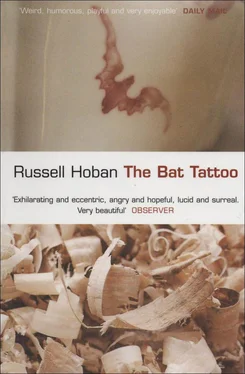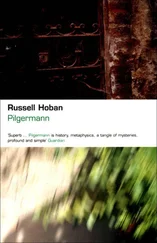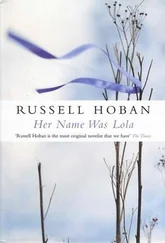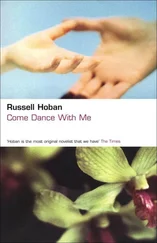Russell Hoban - The Bat Tattoo
Здесь есть возможность читать онлайн «Russell Hoban - The Bat Tattoo» весь текст электронной книги совершенно бесплатно (целиком полную версию без сокращений). В некоторых случаях можно слушать аудио, скачать через торрент в формате fb2 и присутствует краткое содержание. Год выпуска: 2004, Издательство: Bloomsbury Publishing PLC, Жанр: Современная проза, на английском языке. Описание произведения, (предисловие) а так же отзывы посетителей доступны на портале библиотеки ЛибКат.
- Название:The Bat Tattoo
- Автор:
- Издательство:Bloomsbury Publishing PLC
- Жанр:
- Год:2004
- ISBN:нет данных
- Рейтинг книги:4 / 5. Голосов: 1
-
Избранное:Добавить в избранное
- Отзывы:
-
Ваша оценка:
- 80
- 1
- 2
- 3
- 4
- 5
The Bat Tattoo: краткое содержание, описание и аннотация
Предлагаем к чтению аннотацию, описание, краткое содержание или предисловие (зависит от того, что написал сам автор книги «The Bat Tattoo»). Если вы не нашли необходимую информацию о книге — напишите в комментариях, мы постараемся отыскать её.
The Bat Tattoo — читать онлайн бесплатно полную книгу (весь текст) целиком
Ниже представлен текст книги, разбитый по страницам. Система сохранения места последней прочитанной страницы, позволяет с удобством читать онлайн бесплатно книгу «The Bat Tattoo», без необходимости каждый раз заново искать на чём Вы остановились. Поставьте закладку, и сможете в любой момент перейти на страницу, на которой закончили чтение.
Интервал:
Закладка:
I boarded the second-class coach and went to my seat. Soon an old lady was ushered in by a young man who kissed her and left. The old lady smiled and sat down opposite me. She settled back with closed eyes for a moment, then took a computer game out of her handbag and began to play. Only one other passenger came into the compartment, a very abled-looking young man, powerfully built. He took a DISABLED seat by the window and peeled an orange.
I closed my eyes and gave myself to the journey. I had no wish to relive old times; I wanted to stay in the present October to receive what new thoughts might come to me.
I opened my travel book: Riders of the Purple Sage , by Zane Grey, an English edition. Closing my eyes again I saw the rustlers’ cavern behind the waterfall and I saw Bern Venters shoot the Masked Rider, who turned out to be a beautiful girl. He tended her wound and took her to his hidden valley. ‘“I’ll try — to live,” she said. The broken whisper just reached his ears. “Do what — you want — with me.”’
The train was moving. We glided under gantries and wires, past coloured lights and signals of various kinds. Through zones of bleakness we passed, then through human habitations. Sometimes files of poplars marched rearward beyond the gantries and the wires while TGV trains shot by us like thunderbolts. Strange towers and stretches of flatness appeared and disappeared; haggard landscapes, rivers and canals. Graffiti on walls, bridges, and power stations offered illegible messages, some perhaps for me.
Were there so many electrical towers nineteen years ago? Birches, poplars, and willows tried to remember Claude as they struck wistful poses: ‘Was it like this?’ they said. ‘Was it like that?’ The paper sign on the outside of the window said MARSEILLE backwards over sky, trees, hills, valleys, farms, rivers, boats and bridges. At Sens there were little trees on the platform with straight trunks and round leafy tops that might have been done by the Douanier Rousseau.
As we travelled on I found myself looking within more than without. Père Lachaise Cemetery appeared on the screen of my memory in the October of four years ago with the yellow leaves of autumn scattered among the tombs. Women sort themselves according to the famous dead they visit; I recall a lady I met at the tomb of Seurat: she was dotty but nice. And of course always at the supine statue of Victor Noir there are those who rub themselves against him and easily transfer their attentions from a bronze member to a live one. The dead are never lonely in Père Lachaise and the living need not be.
At the time I speak of I was without a long-term female friend, and being a romantic I craved the company of a like-minded person. I went to where Chopin lies, a little south of Bellini and east of Cherubini, near the Carrefour du Grand Rond. The paving stones glistened from the soft rain that had fallen a little while ago; the sky was grey and gentle, the trees sympathetic; almost I could hear a shadowy mazurka as I approached.
I stopped about three metres from the tomb to watch a young woman who was standing before it. She was looking at the marble muse who sits grieving for the departed composer. At the muse’s feet were fresh flowers. Below her, in an oval inset on the plinth, is a relief profile of Chopin.
The woman was wearing jeans, black boots, a yellow wind-breaker, and a black baseball cap with the insignia of the New York Yankees. She had a large shoulder bag. She was short and plump, with a round face and short straight blonde hair. She shook her head sadly and put her bag on the ground, then she took a half-bottle of champagne and two glasses out of it. I was not close enough to read the label on the champagne. She popped the cork which flew straight up, then fell at my feet; she filled the glasses. She raised one to the marble muse, then poured it over the flowers. The second glass she raised to Chopin’s profile, then drank.
Again she shook her head, took a paper bag out of the shoulder bag, put the two glasses in it, placed the bag on the ground and stamped on it. I moved towards her. ‘End of a romance?’ I said.
She turned to me with tears running down her face. I held out my arms and she moved into them. That was how I met Victoria Fawles. The champagne was Pol Roger; I have kept the bottle.
The next stop was Laroche-Migennes; after that came Tonnerre. Sometimes the window filled up with sky, leaving only a thin residue of earth at the bottom of the glass as we continued in a southeasterly direction. Montbard came next. The old woman and the young man had left the train at Tonnerre and there were other people in the compartment now but my mind and my vision did not focus on them. Superimposed on the wall opposite me was the mental image of the tympanum of the west portal of St Lazare. Although Christ is the judge he seems to be pinned there like a butterfly with outspread wings. If there were a God, might He have punished His only son in this way? Might He have said to Christ, ‘You and your big ideas! You took it on yourself to be a ransom for the many; now the many are your problem, and you can judge them through all eternity.’ What a thought.
Sometimes there were hills. It became sunny and we were at Dijon. Here the train stood for a long time while backpackers drank mineral water and Coke and bought things at the vending machine while their shadows did the same. Does Solange remember when we shared an orange at Dijon? I licked the juice that ran down her chin.
South of Dijon we passed vineyards. Next came Beaune, then Chagny, a peaceful little station where I and several others left the train for the 16.43 bus for Autun. Our driver was a short sturdy woman who conversed non-stop with a friend in the first seat while smoothly passing oncoming traffic in streets only wide enough for one car. Then up and down on winding roads through vineyards we went, through Nolay, Epinac, Sully and many smaller towns and villages to arrive at Autun at 18.06.
Through the October darkness I walked slowly up the hill to the Hôtel de la Tête Noir, putting my feet into the footsteps of nineteen years before. Almost I expected to smell the fragrance of Solange’s hair if I turned my head. I registered at the hotel and was given, as I had requested, the key to Room 309, attached by a ring to its miniature bottle. I bought a half-bottle of Pinot Noir, then went up to the room where Solange and I had lain in each other’s arms, had slept and awakened together. I had told myself that I was not going to relive the past but of course this is not possible: what we call the present is only the accumulated past.
I went to the window and raised my glass to the lights of the Champ de Mars and the Mairie. When I had finished the wine I went out and walked to St Lazare past the same dim cafés and ancient houses as before while cars and mopeds passed me going up the hill. At the cathedral I stood with my back to Le Petit Rolin and looked up at the tympanum that Solange and I had looked at together. ‘Speak to me,’ I said to Christ. ‘Speak to me as the son of God. Tell me something.’
‘I have nothing to say,’ said Christ. ‘This is all there is.’
‘But meaning,’ I said, ‘there must be meaning.’
‘Reality has no meaning,’ said Christ, ‘it is only itself. I am only myself; I am an image carved in stone. Gislebertus hoc fecit .’
‘That is not a good enough answer,’ I said. ‘You’re being evasive. Ideas are part of reality. There came to me the idea to travel here to see you and it meant something to me.’
‘What?’ said Christ.
‘I don’t know. That’s what I’m asking you.’
‘I don’t know what this idea meant; sometimes people say they’ve come to see me when they really want to see someone or something else. Maybe God knows.’
Читать дальшеИнтервал:
Закладка:
Похожие книги на «The Bat Tattoo»
Представляем Вашему вниманию похожие книги на «The Bat Tattoo» списком для выбора. Мы отобрали схожую по названию и смыслу литературу в надежде предоставить читателям больше вариантов отыскать новые, интересные, ещё непрочитанные произведения.
Обсуждение, отзывы о книге «The Bat Tattoo» и просто собственные мнения читателей. Оставьте ваши комментарии, напишите, что Вы думаете о произведении, его смысле или главных героях. Укажите что конкретно понравилось, а что нет, и почему Вы так считаете.












